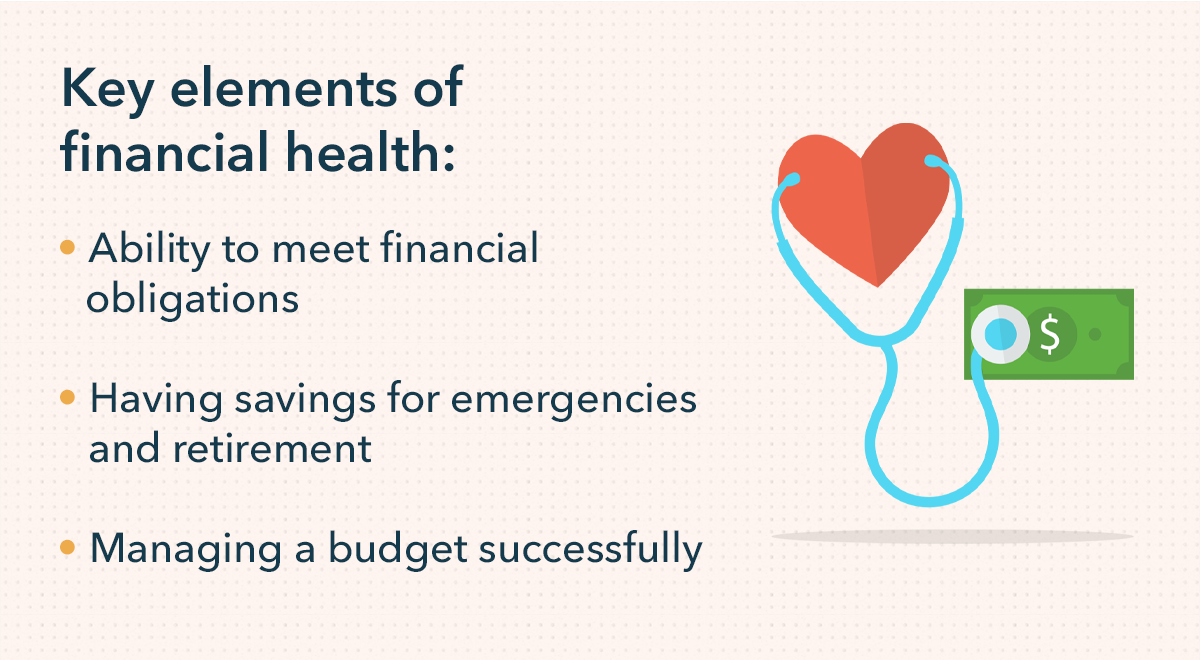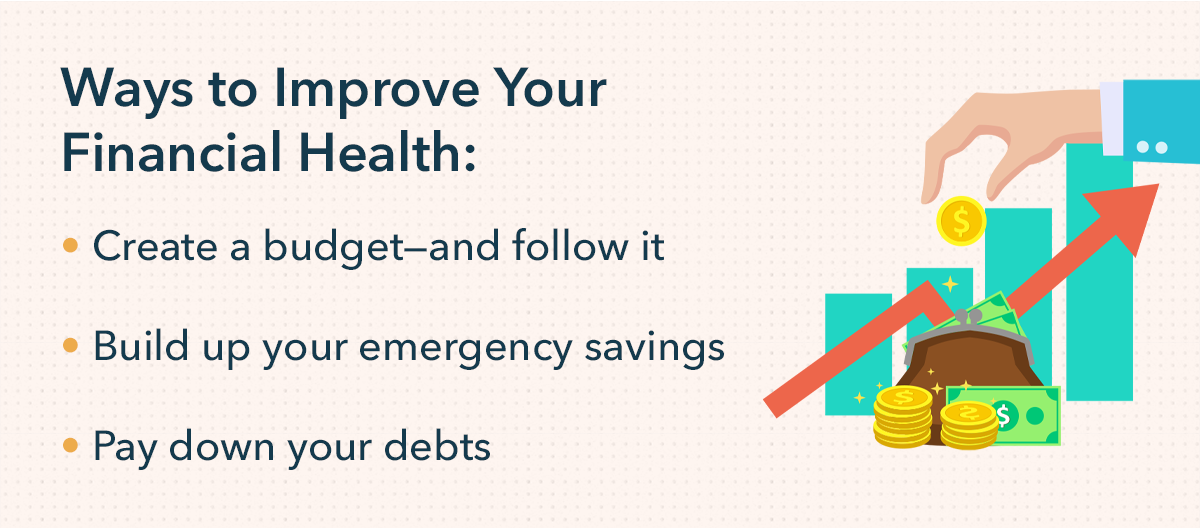Like physical health, financial health is fundamental to a successful and happy life. Poor financial health — including not being able to pay your bills, little or no savings, and a low credit score — can significantly affect your quality of life.
Creating a healthy financial present not only helps to relieve the current stress, but also ensures a safe and stable financial future. You need to be in a good financial position to improve your life in just about every way. Whether you want to rent an apartment, buy a new car or buy a house. However, it doesn’t just apply to your current situation, you should also consider your financial health now so that you can prepare for the best future.
So how do you do that? Don’t panic, in our guide we’ll define financial health, explain what you need to understand about your overall financial well-being and how to improve it when you’re struggling. Use the links below to navigate through the article or keep reading for a complete overview of defined financial health.
What is financial health? Financial Health Definition
You can define financial health in many ways because it is such a broad term. In general, financial health refers to a person’s state of monetary affairs, including:
Whether they can meet their financial obligations How much is saved as a pension fund Whether they are financially prepared for emergencies How much is spent on fixed or non-discretionary expenses
It not only covers all activities related to your money management and how you plan for the future, but also shows the stability and condition of your finances and financial affairs.

Strong financial health is indicated by factors such as:
Stable income stream Strong return on investment Rare changes in spending Growing savings balance Good credit score
Financial experts have provided rough guidelines that act as an indicator of financial health; however, each person’s situation is different. As such, developing your individual financial plan is vital to ensure you are making an effort to achieve your goals and to mitigate the risk of getting into financial difficulties if the unexpected occurs.
How to measure your financial health
There are many ways in which your financial health can be measured. Your total assets and savings represent the funds at your disposal for future or current use.
These are usually affected debts, including credit cards, student and car loans, and refinancing a mortgage. Financial health is an ever-changing measure, depending on one’s wealth and liquidity, as well as the fluctuation in the price of goods and services.

For example, a person’s salary may remain unchanged, while the cost of food, tuition, gasoline, and mortgages may increase. Despite being in good financial health initially, they can face financial difficulties if their earnings fail to keep pace with the rising cost of goods due to inflation.

To better understand your financial health, the following key questions will make it easier for you to self-assess your financial health:
Is your capital positive or negative? How do you deal with a financial crisis? Do you have an emergency fund? Do you have all the things you need in life? What about the things you want? Have you set up a pension fund that will meet all your future needs? Keep in mind that retirement money needs vary from person to person. Have you come up with a 401k plan while keeping the limits of 401k contributions in mind? Do you feel like you can achieve your long-term goals? Have you contributed to the Social Security Fund to enjoy Social Security benefits? What about insurance coverage? Do you have adequate life and health insurance?
If you don’t feel prepared to answer these questions, take a moment to review your finances and see where you stand. Now is a good time to reassess your financial health and start planning if you need to take next steps to improve it.

How to improve your financial health
Usually we are guided by specific rules of thumb such as “you must deposit at least 10% of your income into your pension fund” or “don’t buy a house with an income of more than three years.”
And while these sayings are helpful and time-tested, it’s essential to consider the various decisions that can help improve your financial health based on your current circumstances. Unfortunately, there is no ready-made advice, but there are guidelines.
First, you need to take a hard and realistic look at where you currently stand by calculating your net worth. Consider everything you own, including vehicles, retirement accounts, and other assets, and subtract all debts. Now that you have that number, you can move on to planning your next steps.
Create and track a budget
The first and most important step to improving your financial health is to create a spending plan or personal budget. A personal budget, drawn up on an annual or monthly basis, is an essential tool that helps you:
Reduce or Eliminate Spending Spend Wisely Save for Future Goals Emergency Plan Prioritize Saving and Spending
Multiple approaches can be used when creating a budget; however, they all involve making forecasts for expenses and income. These income and expense figures depend on your current financial situation and may change over time.
When creating a budget, it is not enough to plan what you will spend on, but it is also vital to research the areas where you are already spending. Do you have recurring subscriptions that you don’t need, such as cable? Are there costs you can cut back on? It can be quite coincidental to distinguish between your ‘wants’ and ‘needs’.
You can use mobile apps like Mint or spreadsheets to set a budget. Or go for the conventional and proven envelope method where you allocate an envelope for each budget item such as groceries and keep the allotted money in that respective envelope.
To maintain your financial health, sticking to your budget is essential, as failing to do so can lead to excessive spending and overwhelming debt. Even as you start making more money, sticking to your budget is vital to protect yourself from “lifestyle creep” where you tend to spend more the more money you make.

Build an emergency fund
An emergency fund refers to money set aside for emergency purposes. This fund is useful to pay for things that are not normally included in your personal budget, such as an emergency trip to the dentist or car repairs.
This fund also helps cover your normal expenses if your regular income is interrupted, for example if you lose your job or if you are unable to work due to an accident or illness. While it’s considered best to have three to six months’ worth of living expenses in your emergency fund, unfortunately, this amount isn’t usually enough to weather a loss of income or cover a major expense.
Given today’s uncertain economic conditions, you should aim to: save at least six months in living expenses, if not more. By budgeting such contingencies as regular expenses, you can ensure that you don’t spend that money lightly and keep it for emergencies.
Another thing to keep in mind is that setting up an emergency fund is an ongoing task. It is very possible that once you have a certain amount of money in the fund, you will incur charges that require you to withdraw that amount. Instead of feeling discouraged, you should be glad you were financially prepared.

Pay off debt
Use the snowball or avalanche method to pay off your debt. The snowball method is where you pay the smallest debt balance first and then save to pay the largest debt. With the avalanche method, on the other hand, you pay as much as you can for the highest interest debt first and pay the minimum to everyone else.
Both methods have their own pros and cons. Choose the one that suits you best depending on your preferences for managing money and debt.
Final notes:
Keeping your financial health in top shape can be quite a daunting task. This applies to people with well-paid jobs and even more so to those who struggle to find work. Following financial rules may not be enough to achieve financial success, especially if you have extenuating circumstances or are in the latter category. To ensure excellent financial health, it is vital to develop and build habits that will enable you to make better financial choices and use all the tools at your disposal to help you on the road. to keep on track.
By keeping the above tips in mind, you can ensure that your financial health is off to a good start. We also recommend using a money management app like Mint, which keeps all your financial information in one place.
Related
Sign up for Mint today
From budgets and bills to free credit score and more, you’ll
discover the effortless way to stay on top.
Learn more about security


This post Financial health: definition, tips and examples
was original published at “https://mint.intuit.com/blog/planning/financial-health/”





